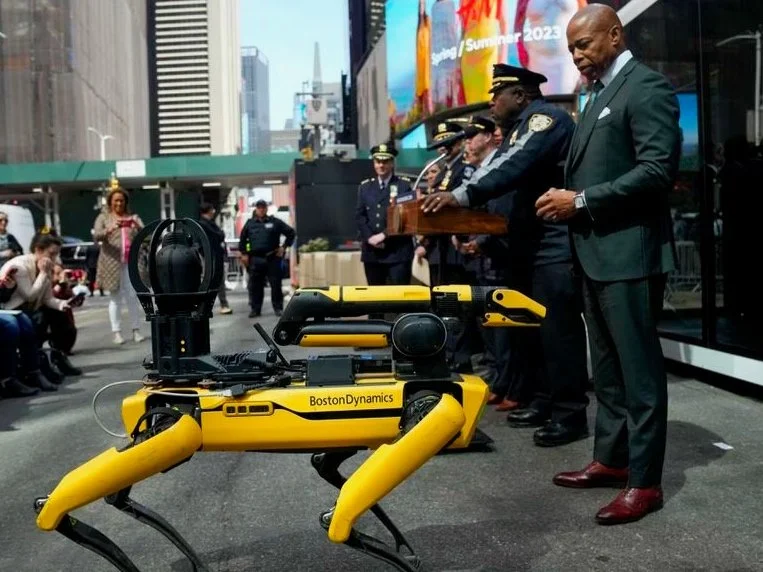Last week, Policing Project Deputy Director Maria Ponomarenko participated on a panel at the Privacy Localism conference, hosted by the Information Law Institute at NYU Law. The panel, “Local Governance of Policing, Surveillance, and Data” highlighted the lack of public input into decisions about police use of surveillance technology, and discussed possible solutions.
2017-2018 Policing Project Camden Youth Program Launched
The 2017-18 session of the Policing Project’s Youth-Police Engagement Program is officially up and running at Woodrow Wilson High School in East Camden, New Jersey! By bringing youth and police officers together in a classroom setting, our program seeks to give youth an active and ongoing voice in how their community is policed, to strengthen youth-police relationships, and to develop a national model for this sort of engagement.
Tampa CRB & Policing Project Launch Community Survey
The Tampa Citizens Review Board (Tampa CRB), with assistance from the Policing Project, has launched an online survey that invites members of the Tampa Bay community to give feedback on the practices and performance of the Tampa Police Department (TPD).
The survey will remain open until December 15, 2017, and all residents of the Tampa Bay area are encourage to participate at: TampaCRBSurvey.org.
Policing Project Releases Report on LAPD Video Release Policy
Today the Policing Project has released its report summarizing public and officer feedback on the LAPD’s policy for releasing video footage of critical incidents—which includes any incident in which an officer fires a gun or an individual dies in police custody. The report is based on [...]
Establishing Best Practices for Stop Data Collection
Few controversies in policing are as fraught as the use of Terry stops—temporary detentions made by officers upon reasonable suspicion of criminal activity, often accompanied by protective pat-down searches known as “frisks.” Studies have shown that racial minorities are disproportionately targeted for Terry stops, raising concerns about [...]
Policing Project’s Public Engagement Process Results in New NYPD Body Camera Policy
The NYPD has released its new body camera policy, responding to public comments solicited through a process run by the Policing Project. The policy will apply to a 1,000-camera pilot project scheduled to begin later this spring. During the summer of 2016, the Policing Project reached [...]
Policing Project Launches Youth Engagement Pilot Programs
The Policing Project is conducting pilot projects in Tampa, Florida and Camden, New Jersey to foster police-youth relations. Based on the report of the Presidential Task Force on 21st Century Policing, the programs focus on bringing youth and police together to work collaboratively to solve an issue [...]
Policing Project Deputy Director Testifies Before Civil Rights Panel
On Tuesday, March 21, Policing Project Deputy Director Maria Ponomarenko testified before the New York Advisory Committee of the U.S. Commission on Civil Rights. She discussed the need for “front-end” democratic accountability around policing, and discussed the Policing Project’s efforts in this regard. She also emphasized the [...]
Policing Project Holds Conference on Cost-Benefit Analysis of Policing Practices
Which policies should police departments adopt? On February 9 and 10, the Policing Project and the Police Foundation convened over twenty experts on policing practices and quantitative methods to explore one possible answer to this question: those policies whose benefits outweigh their costs. [...]
Measuring the Intangible Impacts of Policing
Policing Project to Assist LApC on Body Camera Footage release Policy
The Los Angeles Police Commission has asked the Policing Project to run a community-wide engagement over one of the more complicated questions about body cameras: when to release footage after an officer-involved shooting.
Prompted in part by officer-involved shootings and other uses of force that captured [...]
Policing Project Calls for Improved accountability on Arrest-Related Deaths
In the last several years, a string of high-profile police shootings of unarmed civilians — primarily black men — has attracted national attention, including in the 2016 presidential campaign.
But the federal government continues to have problems collecting complete and accurate data on these shootings, mainly because [...]
Brainstorming the Cost-Benefit Analysis of Policing
What is the psychological cost of being stopped by a police officer? What are the potential privacy costs of using license-plate readers?
Elsewhere in government, questions like these would be a standard part of cost-benefit analysis (CBA) — a common procedure that attempts to identify and weigh [...]
Panelists Tackle the Tough Questions around Policing and Accountability in the Digital Age
The Policing Project and the Brennan Center for Justice co-hosted “Policing and Accountability in the Digital Age” on September 15th, a conference that addresses the challenges and benefits of rapid advances in policing technologies. A cohort of academics, law enforcement leaders, activists, and journalists tackled difficult [...]
Policing Project Receives Grant for Cost-Benefit Analysis Initiative
NYPD Asks Policing Project to Gather Public Input on Body Cameras
Starting today, the New York City Police Department invites individuals and organizations to share their views on its proposed body-worn camera policy by accessing a brief questionnaire and online comment portal at www.nypdbodycameras.org. The site will be accessible until midnight July 31, 2016.
Camden Gives Democratic Policing a Chance
Democratic Policing Students Vet Ideas Before Law Enforcement Officials
Students in NYU Law’s Democratic Policing seminar recently had the opportunity to do something rare: try out their ideas for policing policies before panels of law-enforcement officials who bear the day-to-day responsibility of putting such ideas into action.
Democratic Policing Conference Solicits Law Enforcement Input
On November 12-13, 2015, some of the nation’s leading and most innovative police officials came to NYU Law School to discuss “democratic policing”—the central mission of the Policing Project.
The report of the President’s Task Force on 21st Century Policing begins with the following statement: [...]



















